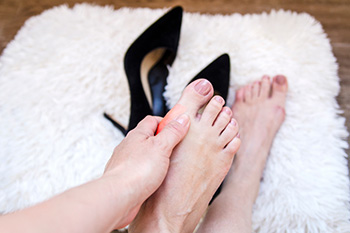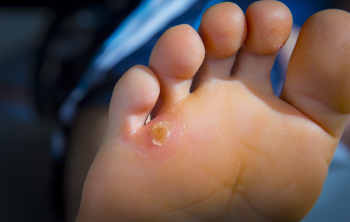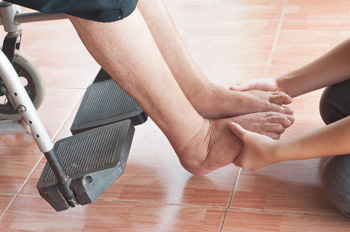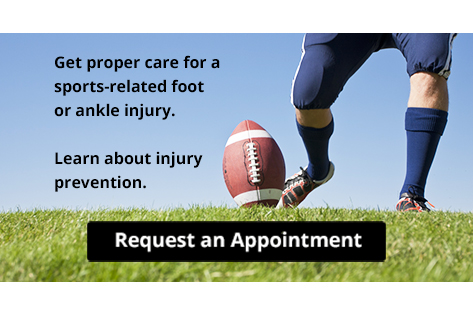Blog
Items filtered by date: September 2023
Negative Effects of Wearing High Heels

Wearing high heels can have serious consequences for your feet and overall well-being. While they may not be the most comfortable footwear, they are occasionally a desired shoe choice. Beyond the immediate discomfort, high heels can lead to several issues including foot and ankle injuries, arthritis, and aggravation of existing foot problems. These can include bunions, hammertoes, and an altered gait. To mitigate these issues, it is important to wear high heels in moderation, stretch regularly, and consider various foot therapy practices, such as reflexology and foot soaks. Choosing more supportive footwear is the ultimate cure for high-heel troubles. If you have foot or ankle pain associated with wearing high heels, it is suggested that you make an appointment with a podiatrist, the health care expert of the feet and ankles.
High heels have a history of causing foot and ankle problems. If you have any concerns about your feet or ankles, contact Stephanie Tine, DPM from Flamingo Foot and Ankle. Our doctor can provide the care you need to keep you pain-free and on your feet.
Effects of High Heels on the Feet
High heels are popular shoes among women because of their many styles and societal appeal. Despite this, high heels can still cause many health problems if worn too frequently.
Which Parts of My Body Will Be Affected by High Heels?
- Ankle Joints
- Achilles Tendon – May shorten and stiffen with prolonged wear
- Balls of the Feet
- Knees – Heels cause the knees to bend constantly, creating stress on them
- Back – They decrease the spine’s ability to absorb shock, which may lead to back pain. The vertebrae of the lower back may compress.
What Kinds of Foot Problems Can Develop from Wearing High Heels?
- Corns
- Calluses
- Hammertoe
- Bunions
- Morton’s Neuroma
- Plantar Fasciitis
How Can I Still Wear High Heels and Maintain Foot Health?
If you want to wear high heeled shoes, make sure that you are not wearing them every day, as this will help prevent long term physical problems. Try wearing thicker heels as opposed to stilettos to distribute weight more evenly across the feet. Always make sure you are wearing the proper shoes for the right occasion, such as sneakers for exercising. If you walk to work, try carrying your heels with you and changing into them once you arrive at work. Adding inserts to your heels can help cushion your feet and absorb shock. Full foot inserts or metatarsal pads are available.
If you have any questions please feel free to contact our office located in Fort Lauderdale, FL . We offer the newest diagnostic and treatment technologies for all your foot and ankle needs.
Get Proper Care for a Sports-Related Foot or Ankle Injury This Fall
Footwear Features for Restaurant Workers

Choosing the right shoes for restaurant workers, who often spend long hours on their feet, is important. The demands of the job, including standing, walking, and navigating through busy kitchens, require shoes that provide comfort, support, and durability. Slip resistance is a key consideration, as restaurant floors can get wet or greasy, especially in fast-paced kitchens. Additionally, opting for shoes with adequate arch support can help prevent foot fatigue and pain, which are common in the food service industry. Cushioned insoles can be helpful for absorbing shock and reducing the impact on the feet of restaurant workers. Breathable materials are a wise choice to keep the feet cool and dry, even during the hottest shifts. Durability is paramount, as restaurant workers need shoes that can withstand constant movement and potential spills. Look for footwear with durable materials and reinforced stitching. Easy-to-clean shoes are practical for maintaining hygiene standards in the restaurant. For any foot problems and further information on footwear for restaurant workers, it is suggested that you make an appointment with a podiatrist.
While working on the feet, it is important to take the proper care of them. For more information about working on your feet, contact Stephanie Tine, DPM from Flamingo Foot and Ankle. Our doctor will treat your foot and ankle needs.
Working on Your Feet
Standing on your feet for long periods of time can cause stress and pain in your feet. Your whole body may experience change in terms of posture, back pain, bunions, callouses and or plantar warts. There are ways to avoid these conditions with proper foot care, smart choices and correct posture.
Positive Changes
Negative heeled shoe – Choosing this shoe type places the heel slightly lower than the ball of the foot. These are great for overall foot health. Find shoes that fit you correctly.
Go barefoot – Our feet were not designed to be enclosed for all hours of the day. Try to periodically expose your feet to air.
Eliminate Pain
Foot Exercises – Performing simple exercises, incorporating yoga and doing stretches are beneficial. This will allow increased blood flow to the area and muscles of the foot.
Achilles tendon – Stretching the foot out flat on the floor will relax the calf muscles and tendon. These exercises can be performed almost anywhere. Make sure you add these exercises to your daily regimen.
With a little bit of this information and knowing more about foot health, you will notice changes. Foot stretches and proper footwear will help with pain and prevent further issues.
If you have any questions please feel free to contact our office located in Fort Lauderdale, FL . We offer the newest diagnostic and treatment technologies for all your foot and ankle needs.
Causes of Seed Corns

Seed corns, those tiny yet painful annoyances on the feet, may sound inconsequential but can be quite uncomfortable. These small, hardened, and sometimes translucent bumps typically develop on the soles of the feet or in between the toes. They are a form of callus, but unlike the regular calluses that form due to friction or pressure, seed corns have a different origin. The causes of seed corns can vary. They often arise from dry skin, which is more prone to developing these small, central core calluses. Ill-fitting shoes that constantly rub against certain areas of the feet can also be a culprit. Additionally, foot deformities or gait abnormalities can increase pressure on specific spots, leading to seed corn formation. While seed corns may seem minor, they can be quite painful while walking. If you are dealing with these tiny irritations on your feet, it is suggested that you consult a podiatrist who can alleviate the discomfort and prevent them from returning, ensuring your feet remain healthy and pain-free.
Corns can make walking very painful and should be treated immediately. If you have questions regarding your feet and ankles, contact Stephanie Tine, DPM of Flamingo Foot and Ankle. Our doctor will treat your foot and ankle needs.
Corns: What Are They? And How Do You Get Rid of Them?
Corns are thickened areas on the skin that can become painful. They are caused by excessive pressure and friction on the skin. Corns press into the deeper layers of the skin and are usually round in shape.
Ways to Prevent Corns
There are many ways to get rid of painful corns such as:
- Wearing properly fitting shoes that have been measured by a professional
- Wearing shoes that are not sharply pointed or have high heels
- Wearing only shoes that offer support
Treating Corns
Although most corns slowly disappear when the friction or pressure stops, this isn’t always the case. Consult with your podiatrist to determine the best treatment option for your case of corns.
If you have any questions please feel free to contact our office located in Fort Lauderdale, FL . We offer the newest diagnostic and treatment technologies for all your foot and ankle needs.
Age-Related Foot Problems

Older adults with foot problems often suffer from an increased risk of frailty, fall-related risks, and gait abnormalities. Foot problems are common among those who are older but do not differ by gender. Body fat percentage is more strongly associated with foot pain than body mass index, possibly due to the inflammatory effects of adipose tissue. Foot problems also cause weakness and exhaustion. Elderly patients with foot problems, especially those with foot pain and neuropathy, walk slower and have altered gait patterns. These issues also reduce the level and pattern of physical activity, which could accelerate frailty in this population. If you are older or taking care of someone who is, it is strongly suggested that you make an appointment with a podiatrist and seek regular exams to keep your feet as problem-free and healthy as possible. Doing so helps ensure increased safety, easier mobility, and greater independence.
Proper foot care is something many older adults forget to consider. If you have any concerns about your feet and ankles, contact Stephanie Tine, DPM from Flamingo Foot and Ankle. Our doctor can provide the care you need to keep you pain-free and on your feet.
The Elderly and Their Feet
As we age we start to notice many changes in our body, but the elder population may not notice them right away. Medical conditions may prevent the elderly to take notice of their foot health right away. Poor vision is a lead contributor to not taking action for the elderly.
Common Conditions
- Neuropathy – can reduce feeling in the feet and can hide many life-threatening medical conditions.
- Reduced flexibility – prevents the ability of proper toenail trimming, and foot cleaning. If left untreated, it may lead to further medical issues.
- Foot sores – amongst the older population can be serious before they are discovered. Some of the problematic conditions they may face are:
- Gouging toenails affecting nearby toe
- Shoes that don’t fit properly
- Pressure sores
- Loss of circulation in legs & feet
- Edema & swelling of feet and ankles
Susceptible Infections
Diabetes and poor circulation can cause general loss of sensitivity over the years, turning a simple cut into a serious issue.
If you have any questions please feel free to contact our office located in Fort Lauderdale, FL . We offer the newest diagnostic and treatment technologies for all your foot and ankle needs.
Blog Archives
- July 2025
- June 2025
- May 2025
- April 2025
- March 2025
- February 2025
- January 2025
- December 2024
- November 2024
- October 2024
- September 2024
- August 2024
- July 2024
- June 2024
- May 2024
- April 2024
- March 2024
- February 2024
- January 2024
- December 2023
- November 2023
- October 2023
- September 2023
- August 2023
- July 2023
- June 2023
- May 2023
- April 2023
- March 2023
- February 2023
- January 2023
- December 2022
- November 2022
